Gold Price Up 2% In Sterling, 11% in Euro As Single Currency Plunges
Commodities / Gold and Silver 2015 Mar 13, 2015 - 06:06 PM GMTBy: GoldCore
 - Gold has risen 11% versus the euro in 2015
- Gold has risen 11% versus the euro in 2015
- Builds on 12% gains against the euro in 2014
- Sentiment poor despite reasonable performance
- Gold performing well considering significant gains in stocks and dollar
- Dollar centric view misleading
- Currency wars intensifying
- Complacency and hubris rife
Gold rose 12% against the euro in 2014 and so far in 2015, gold has risen a further 11% versus the euro. The euro has fallen 23% against gold since January 2014. Gold has risen from EUR 880 per ounce in January 2014 to EUR 1,090 per ounce today. Gold is up 2.1% in sterling this year.
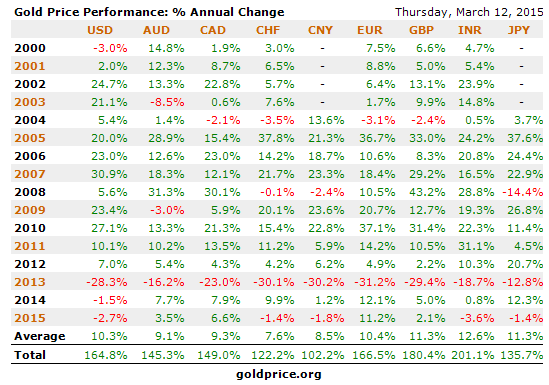
The dollar-centric nature of most financial media and the tendency to focus on gold solely in dollars would give one the impression that gold has been devastated this year.
In dollar terms gold has not fared terribly well, it’s true, but that is more a function of the surge in the dollar than of weakness in gold. Gold’s performance has been quite good considering the significant strength in the dollar and the gains seen in stock markets.
Gold has an inverse correlation with the dollar and stocks over the long term.
How much longer the stock and dollar boom can continue in the face of deteriorating macro-economic data – the worst since the 2008 crisis – is anyone’s guess. The Federal Reserve, like its other central bank counterparts, has done an incredible job in levitating markets and risk assets thus far.
The dollar has soared against most of the currencies in the world but has only eked out very small gains versus gold. Gold has fallen just 2.7% in dollar terms.
When measured against other currencies, gold has risen versus many major currencies. In fact, it has only suffered modest declines in a few currencies this year. Despite, all the negative gold sentiment against the backdrop of central banks globally racing to debase their currencies.
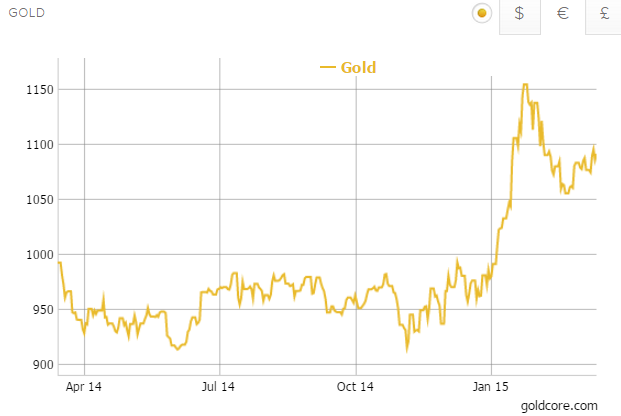
Gold in Euros – 1 Year – GoldCore
Priced in euros, gold opened the year at EUR 980.52. It quickly spiked to EUR 1,154.94 before what appears to be a 50% retrenchment. It then picked up again and at the time of writing, it is priced around the EUR 1,092 mark. So in euro terms gold is actually up around 11% this year.
In GBP gold followed roughly the same pattern but did not rebound so well due to recent sterling strength and is currently trading slightly above its price at the start of the year.
We expect qold to be supported in the near term and to rise in the longer term as the ECB lurches into its QE program. The expectation that the ECB will inject massive liquidity into the financial system by buying up bonds en masse has been met with unquestioning enthusiasm.
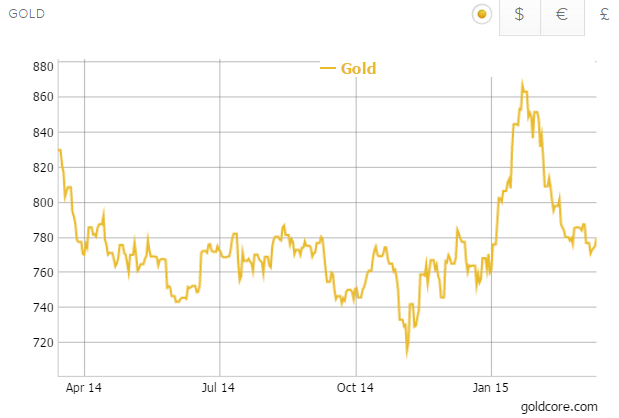
Gold in Sterling – 1 Year – GoldCore
We do not share this enthusiasm. The anticipation of this monetary experiment has already caused the euro to plunge. This should aid exporters in the coming months. But in the longer term it will lead to inflation as importers have to pay more for their raw materials and the public have to pay higher prices for imported goods.
Also of vital importance is that most central banks are involved in competitive currency devaluations.
Therefore, in the medium and long term, currency devaluations will be of little benefit to exporters as most central banks are engaged in the same ‘beggar thy neighbour’ trade and currency wars. So far this year twenty four central banks globally have lowered interest rates in a bid to weaken their currencies to aid their export sectors and create jobs and economic growth.
The haphazard manner in which this QE experiment is being executed in the EU is also concerning. In the absence of a truly centralised central bank it has fallen to national central banks to purchase the bonds that will create a sustainable recovery. The lack of oversight is ripe for abuse of the system.
The experiment has only been in operation for four days and already there are serious questions over whether it can be actually implemented as planned. Due to arcane accountancy rules governing the quality of bonds which may be purchased it appears that there simply may not be enough bonds to meet demand.
Given that the ECB flagged its intention to engage in QE long in advance, the bond markets have already factored in anticipated massive central bank purchases. If it turns out that the central banks cannot buy their expected allocation of bonds it will likely cause chaos in the bond markets.
The uncertainty now hanging over the European bond markets cannot have been alleviated by reports that Greek Finance Minister Varoufakis said on Tuesday that “Greece would never pay back its debts,” which was followed by Prime Minister Tsipras confirming that “Greece cannot pretend its debt burden is sustainable.”
Greece’s future in the Eurozone is still questionable. The BBC is now warning that Greece may be pivoting towards Russia. They report that a “drove of Greek cabinet members will be heading to Moscow” in May, a month before the current bail-out arrangement expires.
Anticipation of ECB QE has also caused European stock markets to rise considerably. These price rises have not been matched by a rise in earnings or dividends indicating a liquidity driven bubble in some European and other indices.
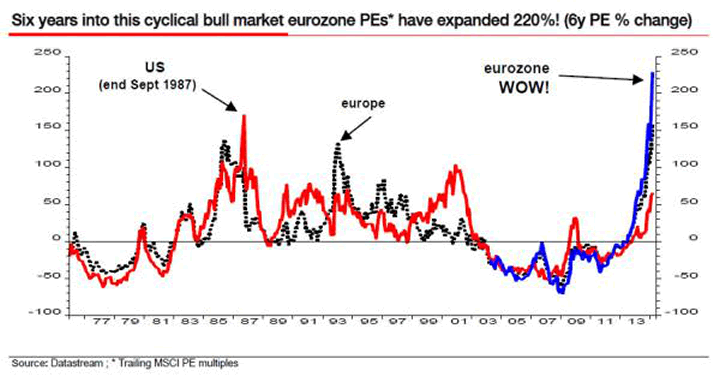
Albert Edwards via SocGen
By some measures, US stock markets are more overvalued than they were in 2008.
The subprime bubble and meltdown of 2007 has now been surpassed by large bubbles in auto loans, student loans, many tech and biotech stocks, junk bonds and other sections of the bond market.
Compounding the risks is the fact that there is now $8 trillion more in public and private debt in just the United States alone.
The imbalances, distortions and malinvestment that caused the 2008 meltdown are much worse today than they were in 2008. As is the complacency and hubris.
And many of the same people who got us into this mess remain at the helm and are pursuing the same ultra loose monetary policies that got us into the debacle.
Given the risks of today – the euro and other currency QE experiments, competitive currency devaluations, currency wars, bail-ins, stock and bond market bubbles – gold will continue to protect and grow wealth over the long term.
Download Insight: Currency Wars: Bye Bye Petrodollar – Buy, Buy Gold
MARKET UPDATE
Today’s AM fix was USD 1,156.50, EUR 1,091.24 and GBP 779.58 per ounce.
Yesterday’s AM fix was USD 1,161.25, EUR 1,094.90 and GBP 774.48 per ounce.
Gold fell 0.06% percent or $0.70 and closed at $1,153.30 an ounce yesterday, while silver climbed 0.45% or $0.07 to $15.57 an ounce.
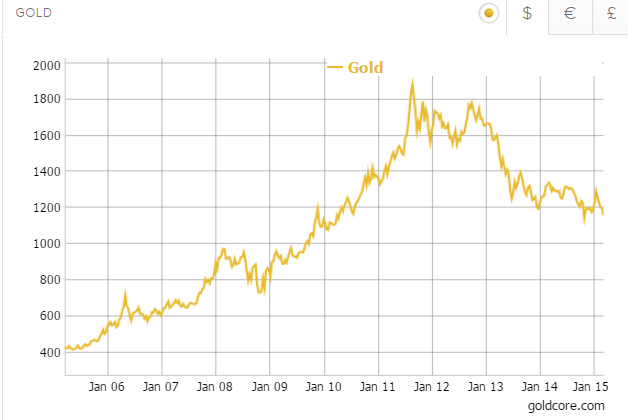
Gold in Dollars – 10 Years – GoldCore
In Singapore, bullion for immediate delivery inched up 0.5 percent to $1,159.30 an ounce near the end of day trading. The yellow metal has seen nine straight sessions of losses which equates to its longest losing streak since August 1973, when it fell for ten consecutive days.
In London, spot gold is trading at $1,156.88 or up 0.24 percent. Silver is down 0.49 percent at $15.56 and platinum is up 0.45 percent at $1,123.42.
Gold Sentiment Very Poor As Speculators Sell Yet Bullion Demand Robust
Gold looks to be headed for its sixth weekly drop in seven weeks. Sentiment towards gold is quite negative after the recent price falls.
Gold has been pressurised by liquidations from the more speculative side of the market – with ETFs and in the futures market. Holdings in the SPDR Gold Trust, the world’s largest gold exchange-traded fund, fell 0.28 per cent to 750.95 tonnes on Thursday – the lowest since late January.
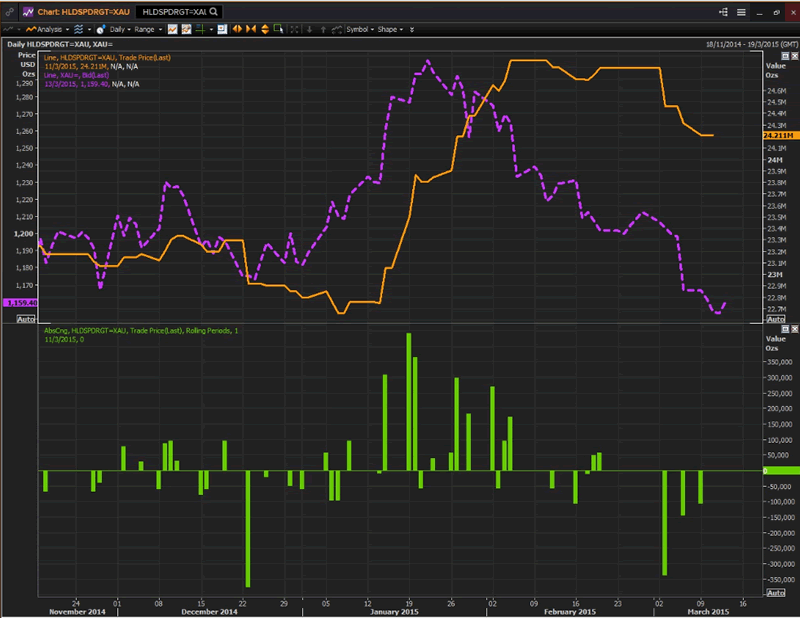
Unusually, the fund hasn’t seen any inflows since February 20 – see chart on flows into the ETF, and how it’s been tracking gold prices, although gold has fallen by much more than the ETF holdings.
Gold is weaker and yet, there has been very little liquidations of physical coins and bars and bullion demand in China and India remained robust in recent weeks and actually picked up this week.
Premiums in India remain close to $2 and in China they remain over $5 per ounce.
Reuters report that traders in Asia spoke of robust demand this week. “Demand has increased a little bit because of the drop in prices but there is no big rush,” said Bachhraj Bamalwa, director at the All India Gems and Jewellery Trade Federation.
Asian buyers again are using weakness in gold and silver prices to accumulate bullion.
U.S. Mint figures show demand has been robust in March. Sales of gold American Eagle coins by the U.S. Mint have been strong, already almost matching last March’s total (at 20,500 oz so far this month, vs 21,000 oz last year) and outstripping February’s (18,500 oz).
Silver American Eagle sales aren’t doing so well, however. Sales total 1.3735 million so far this month, compared to 3.022 million oz in February and 5.354 million oz in March 2014.
Interestingly, according to Amanda Cooper of Thomson Reuters posting in the Global Gold Forum:
“Until yesterday, gold had fallen for 8 days in a row, which is pretty steep going even for the gold market when it gets gloomy. The last time gold fell that many days in a row was March 2009.
A closer look at the chart reveals that gold has only ever fallen by that many days in a row three times since the gold standard was abolished in the 1970s. Since Reuters gold data began in 1968, gold has only fallen for 9 days once, back in August 1973.”
It is worth noting that in the months following the 8 days of falls in 2009, gold prices surged.Gold rose from $892 per ounce in March 2009 to over $1,200 per ounce just 8 months later in November 2009. This was a rise of nearly 35%. A similar rise today would see gold rise from $1,155 per ounce today to over $1,550 per ounce.
Caveat emptor and past performance is no guarantee of future returns.
It takes a brave or foolish investor to buy after such price falls and we always caution never to “catch a falling knife.”
However, an attractive buying opportunity looks set to soon present itself.
Dollar, pound and euro cost averaging into a physical position remains prudent.
This update can be found on the GoldCore blog here.
Mark O'Byrne
Director
IRL |
UK |
IRL +353 (0)1 632 5010 |
WINNERS MoneyMate and Investor Magazine Financial Analysts 2006
Disclaimer: The information in this document has been obtained from sources, which we believe to be reliable. We cannot guarantee its accuracy or completeness. It does not constitute a solicitation for the purchase or sale of any investment. Any person acting on the information contained in this document does so at their own risk. Recommendations in this document may not be suitable for all investors. Individual circumstances should be considered before a decision to invest is taken. Investors should note the following: Past experience is not necessarily a guide to future performance. The value of investments may fall or rise against investors' interests. Income levels from investments may fluctuate. Changes in exchange rates may have an adverse effect on the value of, or income from, investments denominated in foreign currencies. GoldCore Limited, trading as GoldCore is a Multi-Agency Intermediary regulated by the Irish Financial Regulator.
GoldCore is committed to complying with the requirements of the Data Protection Act. This means that in the provision of our services, appropriate personal information is processed and kept securely. It also means that we will never sell your details to a third party. The information you provide will remain confidential and may be used for the provision of related services. Such information may be disclosed in confidence to agents or service providers, regulatory bodies and group companies. You have the right to ask for a copy of certain information held by us in our records in return for payment of a small fee. You also have the right to require us to correct any inaccuracies in your information. The details you are being asked to supply may be used to provide you with information about other products and services either from GoldCore or other group companies or to provide services which any member of the group has arranged for you with a third party. If you do not wish to receive such contact, please write to the Marketing Manager GoldCore, 63 Fitzwilliam Square, Dublin 2 marking the envelope 'data protection'
GoldCore Archive |
© 2005-2022 http://www.MarketOracle.co.uk - The Market Oracle is a FREE Daily Financial Markets Analysis & Forecasting online publication.



